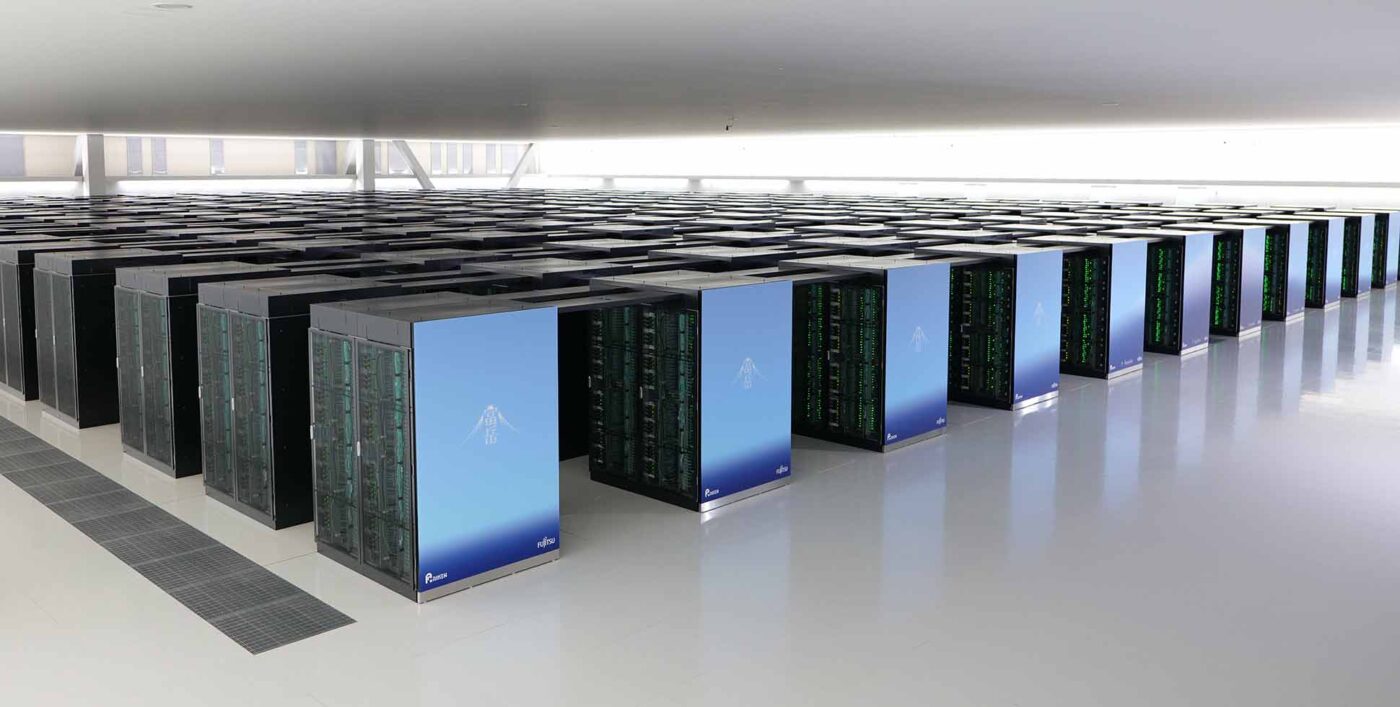Fujitsu A64FX: Arm-powered Heart of World’s Fastest Supercomputer

The beating heart of Fugaku, the world’s fastest supercomputer, is the Fujitsu A64FX Arm-based processor. The result of a multi-year research and development investment from the Japanese government, the Fujitsu A64FX is one of the most powerful Arm-based processors in the world.
You might have previously associated Arm with smaller, low-power devices: smartphones, televisions, smart speakers and Internet of things (IoT) devices. The Fujitsu A64FX demonstrates the power of Arm technology within the most demanding field of computational science: high-performance computing (HPC).
Yet thanks to Arm’s decades of low-power computing development, Fujitsu was able to design the Fujitsu A64FX processor to deliver world-leading performance at efficiency levels rarely seen in HPC. It’s also the first processor to use the Arm Scalable Vector Extension (SVE) instruction set to increase the available vector length from the 128-bit Armv8-A instruction set standard to a 512-bit vector length in the Fujitsu A64FX implementation.
Vectors—one-dimensional arrays of data—have been fundamental to performant yet energy-efficient computing since the world’s first commercially successful supercomputer, the Cray-1 in 1976. Simply put, the more vectors (and the longer those vectors) of data a computer can process at any one time, the more powerful it can be. While the technology itself may be tried and tested, its implementation in the Fujitsu A64FX is absolutely cutting-edge: a 512-bit vector length is double that of Fujitsu’s previous supercomputing processor, used in Fugaku’s predecessor the K Computer.
Custom technology extensions in Fujitsu A64FX
The Fujitsu A64FX is also empowered by the openness of Arm’s business model which enables Arm partners to add in their own custom technology extensions. It contains Fujitsu’s Tofu-D interconnect, delivering massive node-to-node and networking bandwidth, and HBM2 memory integration for over 1 terabyte per second of on-chip memory bandwidth.
Add it all up, and the Fugaku supercomputer consists of 432 racks with a total of 158,976 Fujitsu A64FX processors and 8 million Arm cores. It’s a showcase of the very best HPC technology, representing the pinnacle of Arm performance and efficiency. But look beyond the numbers and you’ll find it’s also far more than that: Fugaku has the potential to tackle some of the world’s most challenging social and scientific problems.
Fugaku: A key player in Japan’s vision for Society 5.0
Fugaku will be a key player in realizing Japan’s vision for its Society 5.0. Described as “a human-centered society that balances economic advancement with the resolution of social problems by a system that highly integrates cyberspace and physical space,” the idea of Society 5.0 is to resolve social challenges by incorporating the technological innovations of the fourth industrial revolution (e.g. IoT, big data, artificial intelligence (AI), robotics and the sharing economy), into industrial and social life, ultimately making people’s lives more comfortable and sustainable.
The main social and scientific challenges Fugaku will help tackle in the journey towards Society 5.0 are as follows:
Achievement of a society that provides health and longevity
Fugaku will support innovative drug discovery infrastructure through functional control of biomolecular systems. This method of drug development is set to lead to the creation of highly efficient new drugs with few side effects. As well as this, for the first time, scientists will be able to analyze big data on diagnostics and genomics, as well as conduct large-scale biomedical simulations. This will increase understanding of a number of conditions and allow research on methods of prevention, early detection, and personalized treatment plans.
Disaster prevention and global climate challenges
This unprecedented technology will empower the development of integrated simulation systems for hazards and disasters induced by earthquakes and tsunamis. Utilizing big data, scientists will also be able to make more accurate predictions of extreme weather events and the damage they may cause, as well as predict man-made environmental effects and, in turn, contribute to the formulation of policies for environmental protection.
Energy challenges
The computational power provided by this Fujitsu A64FX powerhouse will allow large-scale simulations for the creation, conversion, and efficient use of energy, contributing to the accelerated development of new energy technologies. Think carbon-free coal gasification plants, low-cost, long-lasting fuel cells, large-scale wind power farms at sea, and nuclear fusion power plants.
Enhancement of industrial competitiveness
Fugaku will prove itself instrumental in the creation of new devices and high-performance materials to support next-generation industries by allowing scientists to conduct unprecedented simulations involving tens of millions of atoms. This means simulations are more comparable to reality so that practical application is possible at the industry level.
Development of basic science
From elementary particles to dark matter and the universe itself, this technology gives scientists more power to learn about the fundamental laws and evolution of the universe than ever before. By combining precise calculations with experimental and observational data, the Fujitsu A64FX-powered Fugaku will help elucidate the many mysterious aspects of the universe.
And Fugaku is just the first of what is likely to be a number of supercomputers powered by the Fujitsu A64FX, used to tackle vital challenges such as those above. Later this year, the Isambard 2 supercomputer, built by the GW4 Alliance and housed in the UK’s Met Office headquarters in Exeter, UK, will come online powered by the Fujitsu A64FX. Once operational, Isambard 2 will be the largest Arm-based supercomputer in Europe.
Discover how Arm technology meets the demands of the most challenging HPC applications.
Main image of Fugaku supercomputer credit: RIKEN
Any re-use permitted for informational and non-commercial or personal use only.











